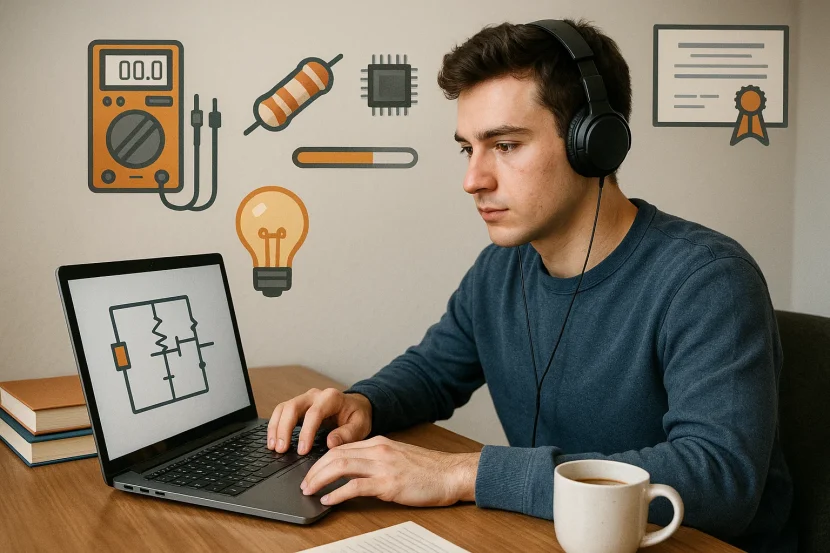An online certification in electronics demonstrates your commitment, builds foundational skills, and enhances your CV—especially if you’re aiming for technician or entry-level roles. Certifications from reputable platforms add credibility and help you communicate professionally your qualifications to employers.
Top Beginner-Friendly Electronics Courses
1. Introduction to Basic Electronics (Alison)
A free foundational course covering circuit theorems, semiconductors, RC/RL circuits, and simulations. Ideal for building core concepts before diving deeper.
2. Basic Electronics (eLearn College)
A paid diploma course at ~£199. Covers components, circuit diagrams, digital electronics, and includes practical projects and assessments.
3. Crash Course Electronics & PCB Design (Udemy)
Hands-on 100+ hour course covering analog/digital electronics, Ohm’s Law, transistors, and PCB design with Altium. Highly rated certification course.
4. Digital Electronics Crash Course (Udemy)
Focused on digital electronics fundamentals—logic gates, digital circuits, and microcontrollers. Highly rated for beginners.
5. Analog & Digital Electronics Certification (DIYguru)
An AICTE-recognized 50‑hour self-paced course with optional DIY project kit and NEAT certification. Great for practical.
6. Circuits and Electronics (MIT xPRO via edX)
A rigorous, university-level MOOC covering circuit fundamentals, analog/digital design, and online lab sessions. Free to audit, paid certificate option.
What Reddit Users Say
Redditors weigh in on the value of online courses vs. hands-on projects:
“Look up Ben Eater… He’s an incredible teacher and has a number of series on electronics from beginner upwards.”
“Employers generally don’t care about Coursera or edX ‘certifications’… The degree is the only qualification you need. Just take courses if you think you can learn something.”
Insight: Certifications help if they teach real skills and allow you to showcase projects—not just certificates.
Choosing the Right Course
| Course Type | Best For | Certification |
|---|---|---|
| Free Intro Courses | Testing interest, low commitment | Alison, edX audit |
| Paid Self‑Paced | Structured learning with credentials | Udemy, DIYguru |
| University‑Level | Deeper theory + labs, industry credibility | Paid Self-Paced |
Maximize Your Certification
- Apply Learning to Projects—Build a simple circuit or PCB to demonstrate your skills.
- Include on Your CV and LinkedIn— List the course, certifying platform, and project with metrics.
- Share on GitHub or Portfolio—Showcase diagrams, photos, and code from your build.
🔗 Related Links




